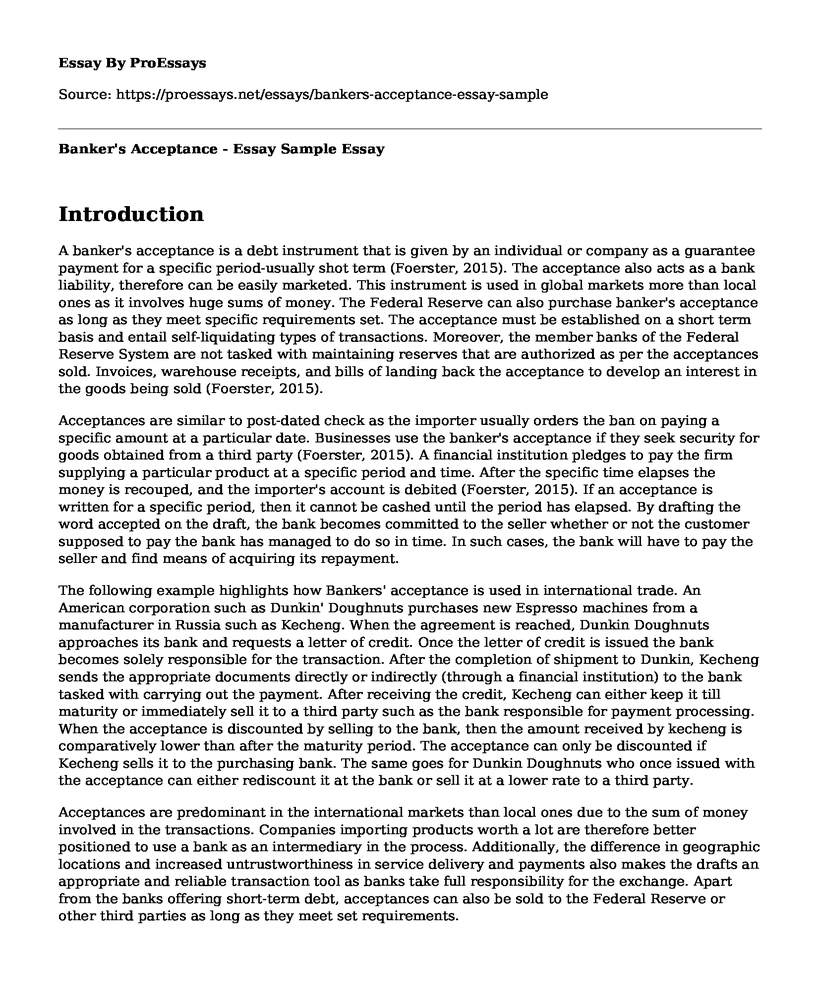Introduction
A banker's acceptance is a debt instrument that is given by an individual or company as a guarantee payment for a specific period-usually shot term (Foerster, 2015). The acceptance also acts as a bank liability, therefore can be easily marketed. This instrument is used in global markets more than local ones as it involves huge sums of money. The Federal Reserve can also purchase banker's acceptance as long as they meet specific requirements set. The acceptance must be established on a short term basis and entail self-liquidating types of transactions. Moreover, the member banks of the Federal Reserve System are not tasked with maintaining reserves that are authorized as per the acceptances sold. Invoices, warehouse receipts, and bills of landing back the acceptance to develop an interest in the goods being sold (Foerster, 2015).
Acceptances are similar to post-dated check as the importer usually orders the ban on paying a specific amount at a particular date. Businesses use the banker's acceptance if they seek security for goods obtained from a third party (Foerster, 2015). A financial institution pledges to pay the firm supplying a particular product at a specific period and time. After the specific time elapses the money is recouped, and the importer's account is debited (Foerster, 2015). If an acceptance is written for a specific period, then it cannot be cashed until the period has elapsed. By drafting the word accepted on the draft, the bank becomes committed to the seller whether or not the customer supposed to pay the bank has managed to do so in time. In such cases, the bank will have to pay the seller and find means of acquiring its repayment.
The following example highlights how Bankers' acceptance is used in international trade. An American corporation such as Dunkin' Doughnuts purchases new Espresso machines from a manufacturer in Russia such as Kecheng. When the agreement is reached, Dunkin Doughnuts approaches its bank and requests a letter of credit. Once the letter of credit is issued the bank becomes solely responsible for the transaction. After the completion of shipment to Dunkin, Kecheng sends the appropriate documents directly or indirectly (through a financial institution) to the bank tasked with carrying out the payment. After receiving the credit, Kecheng can either keep it till maturity or immediately sell it to a third party such as the bank responsible for payment processing. When the acceptance is discounted by selling to the bank, then the amount received by kecheng is comparatively lower than after the maturity period. The acceptance can only be discounted if Kecheng sells it to the purchasing bank. The same goes for Dunkin Doughnuts who once issued with the acceptance can either rediscount it at the bank or sell it at a lower rate to a third party.
Acceptances are predominant in the international markets than local ones due to the sum of money involved in the transactions. Companies importing products worth a lot are therefore better positioned to use a bank as an intermediary in the process. Additionally, the difference in geographic locations and increased untrustworthiness in service delivery and payments also makes the drafts an appropriate and reliable transaction tool as banks take full responsibility for the exchange. Apart from the banks offering short-term debt, acceptances can also be sold to the Federal Reserve or other third parties as long as they meet set requirements.
References
Foerster, S. (2015). Financial management: concepts and applications. Pearson Higher Ed.
Cite this page
Banker's Acceptance - Essay Sample. (2022, Dec 07). Retrieved from https://proessays.net/essays/bankers-acceptance-essay-sample
If you are the original author of this essay and no longer wish to have it published on the ProEssays website, please click below to request its removal:
- Cost Behavior Analysis: Auburn Circular Club
- Computer Ethics in the Workplace Essay
- Delivering Negative News Essay
- Analysis of Apple Case Paper Example
- Essay Example on Apple's Success in China: Merits of Following Procedures
- Essay Sample on Leadership: Encouraging Change in the Church
- Essay on Educational Leaders as Technology Navy in Dubai Schools: Survey Findings







